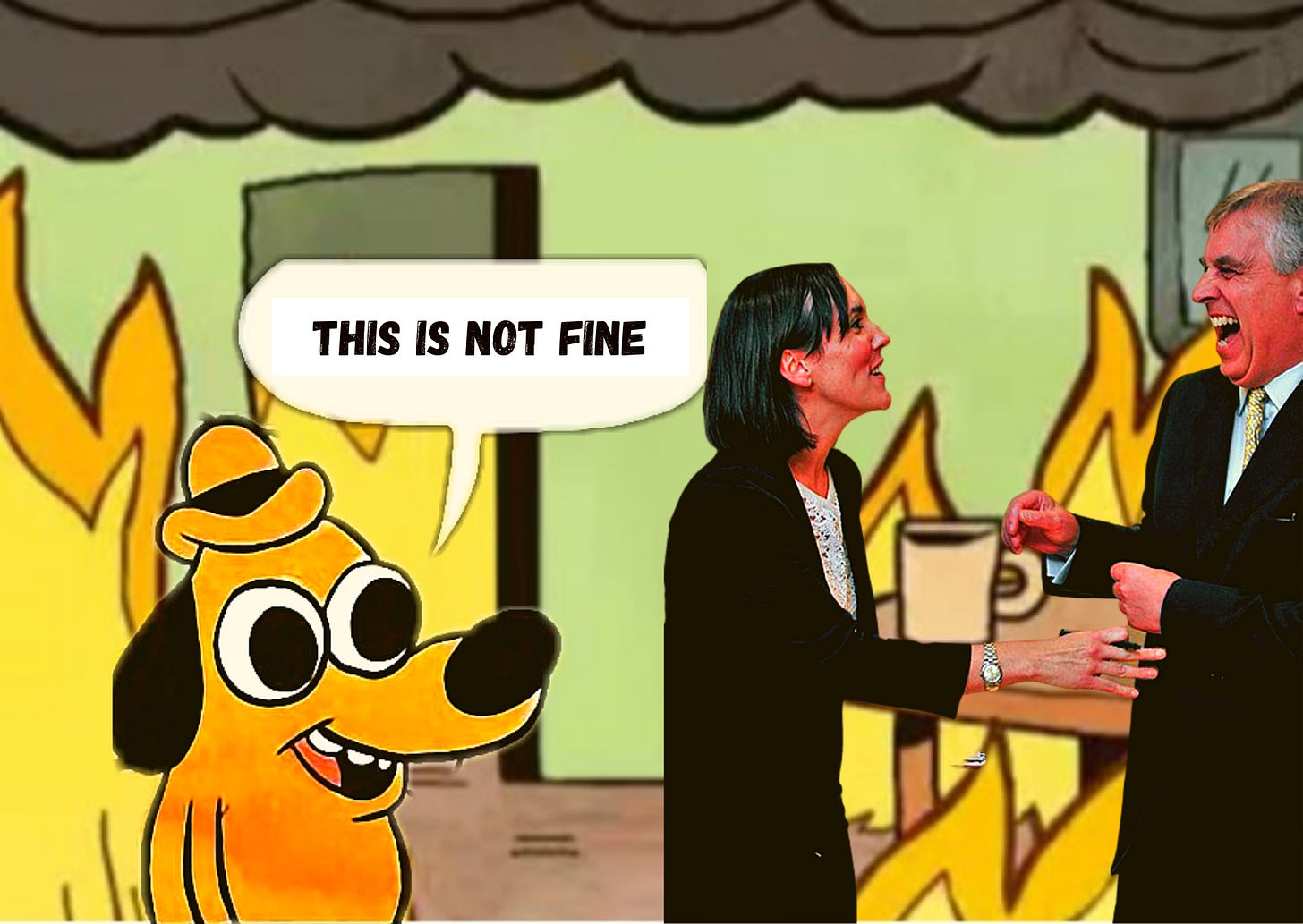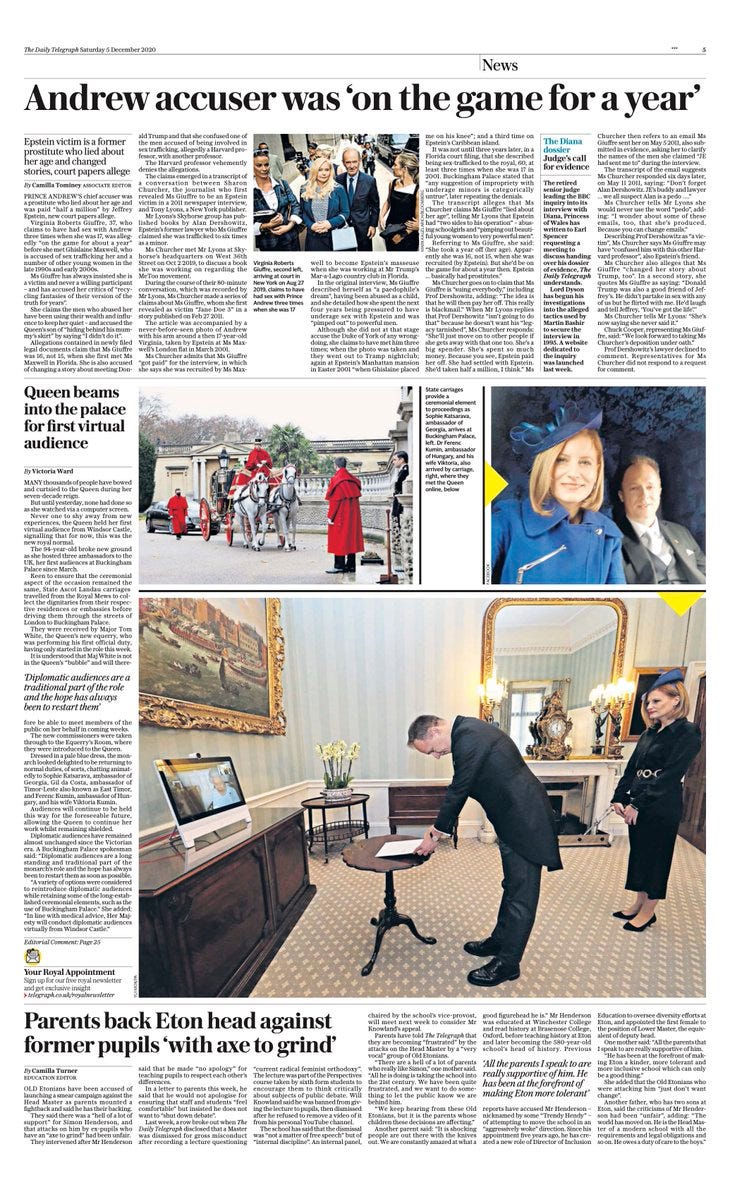Hiding behind a headline: Telegraph journalist conveniently spins court claims against Prince Andrew's accuser
"This is a straight news report," says Camilla Tominey, spinning at 45rpm.
On Saturday, The Daily Telegraph published a news story headlined
Andrew accuser was ‘on the game for a year’
It was written by The Daily Telegraph’s Associate Editor, Camilla Tominey, and focused on claims in recently submitted court documents that Virginia Roberts Giuffre — who alleges Prince Andrew had sex with her three times when she was 17, worked as a sex worker for around a year before she met Ghislaine Maxwell, who is charged with trafficking her and a number of other young women for Jeffrey Epstein, from the late 1990s onwards. That claim and others come from Sharon Churcher, a journalist who interviewed Giuffre and was the first to name her as one of Jeffrey Epstein’s victims
You can see the page as presented in the printed newspaper below:
I’ve included the full print page in this newsletter to put the story in context — placed as it is cheek by jowl with a puff piece about the Queen conducting audiences via Zoom and a culture war story about the ongoing Eton brouhaha. The headline stuck on the story is particularly important; while it leans heavily on those speech marks, it gives an impression of something more than a claim — it reads as a statement of fact.
You can read the full text of the story without a paywall here, as the Irish Independent has syndicated Tominey’s exclusive.
Responding to criticisms of the story’s framing from other Twitter users, Tominey described the piece as “a straight news report of claims — including a right of reply on all sides”. However, while Roberts Giuffre’s lawyer is quoted, suggesting the article is ‘straight news reporting’ stretches credulity as Telegraph journalism tends to do.


Here are the opening paragraphs of the article with the loaded phrases bolded and numbered to highlight how Tominey is able to inject inference into the piece while maintaining a plausible impression of ‘balance’:
Prince Andrew’s chief accuser (1) was a prostitute (2) who lied about her age (3) and was paid “half a million” by Jeffrey Epstein (4), new court papers allege (5).
Virginia Roberts Giuffre (37), who claims to have had sex with Andrew three times (6) when she was 17, was allegedly “on the game for about a year” (7) before she met Ghislaine Maxwell, who is accused of sex trafficking her and a number of other young women in the late 1990s and early 2000s.
Ms Giuffre has always insisted (8) she is a victim and was never a willing participant. She claims (9) the men who abused her have been using their wealth and influence to keep her quiet.
Allegations contained in newly filed legal documents claim that Ms Giuffre was 16, not 15, when she first met Ms Maxwell in Florida. (10) She is also accused of changing a story about meeting Donald Trump (11) and that she confused one of the men accused of being involved in sex trafficking, allegedly a Harvard professor, with another professor. (12) The Harvard professor vehemently denies the allegations.
Let’s take each of the insinuations in turn:
‘Chief accuser’ implies a kind of witch trial set up where Roberts Giuffre is engaged in an organised attack on Prince Andrew, rather than someone who is alleging that he committed serious crimes in which she was a victim.
The use of the word “prostitute” is archaic and quite deliberate.
The implication that the accuser in sexual assault and rape cases led the accused on by lying about their age is a very old tactic.
If — and it’s a huge if — Epstein had paid off a victim would that make them any less of a victim? Rich men often use their wealth to avoid the consequences of their actions.
The placement of “new court papers allege” is important. If it were at the start of the sentence it would encourage the reader to question the claims more. By putting it at the end, the allegations are in the reader’s mind before they are given any sense of doubt.
‘Claims’ could be replaced by the word “says” but using “claims” turns the sentence in the favour of the Prince, adding to the overall sense of excessive doubt being cast around Roberts Giuffre’s version of events.
“On the game for about a year” is an extremely off-hand way of discussing a young woman allegedly working as a sex worker aged either 15 or 16. Even if this turned out to be true, would it mean the allegation was less serious? No.
“… has always insisted” again implies someone struggling to make their case.
See point 6.
Teenagers girls often lie about their age. Again, if this point was true, would it change the substance of the case? No, but it allows for a certain snide doubt.
Accusers in sexual assault cases are often put under pressure over inaccurate memories. Defence teams use natural inconsistencies in memory to build up an impression that the accuser is more generally unreliable or unbelievable.
See point 11.
Further down, Tominey introduces direct quotes from the transcript of Churcher’s conversation with Tony Lyons, a New York publisher who has put out books by Alan Dershowitz (a well-known lawyer and former Harvard professor, who Robert Giuffre alleges was involved in Epstein’s crimes and which he denies vehemently). The key thing here is the use of words that suggest doubt in Churcher’s assertions:
“She took a year off (her age). Apparently, she was 16, not 15, when she was recruited (by Epstein). But she’d be on the game for about a year then.”
"Because you see, Epstein paid her off. She had settled with Epstein. She’d taken half a million, I think.”
The context of these claims is important too; they occurred during a taped conversation in private between Churcher and someone inclined to support the recounting of events put forward by Dershowitz. It’s not for nothing that Roberts Giuffre’s lawyer, Chuck Cooper, pointedly says: “We look forward to taking Ms Churcher’s deposition under oath.”
Am I suggesting that Tominey is wrong to report the claims? No. There’s an obvious public interest argument for doing so — the case involves a major public figure and concerns serious accusations about him. What I’m saying is wrong is that she has framed the story in a way that clearly puts the weight of doubt on the alleged victim.
That Tominey’s Twitter avatar is a picture of her with The Queen and her Twitter header is the headline of a previous Royal story she broke, “Harry’s Secret Romance” — revealing his relationship with Meghan Markle — increases the sense that her access to the Monarchy is very important to her professionally. After all, her role as Associate Editor is further defined as focusing on “politics and the Royals”. Despite that, it might have been wise to remove the chummy pictures of her with Prince Andrew from her personal website after the allegations around him became so serious.

Responding to criticism of her reporting with indignation and claims that it is ‘straight’ shows Tominey has the same attitude as many of her Telegraph colleagues. It is a paper powered by indignation, self-righteousness, and spite. That another Royal reporter, Robert Jobson, weighed in to call her “a first-class journalist and commentator” is illustrative only of British journalism’s tendency to circle the wagons and the particularly incestuous quality of Royal ‘journalism’.
As I finish up this edition, I’ll make this prediction: For daring to criticise the sainted Daily Telegraph and its energetic Associate Editor, I’ll be personally attacked by Telegraph staffers today. They’ll say that I’m a) unemployable and b) bitter (as someone who’s a former contributor to the Telegraph before its metamorphosis into a fanzine for the far-right). Well, a) — is untrue but they’re bang on with b)…
I am bitter to see such bad (and bad faith) journalism rewarded so handsomely. We should expect better reporting around accusations of sexual abuse, exploitation, and rape and for journalists not to gaslight those who criticise their approach. I get in a sweat about these issues, even if Prince Andrew claims he’s physically unable to…




